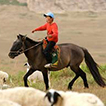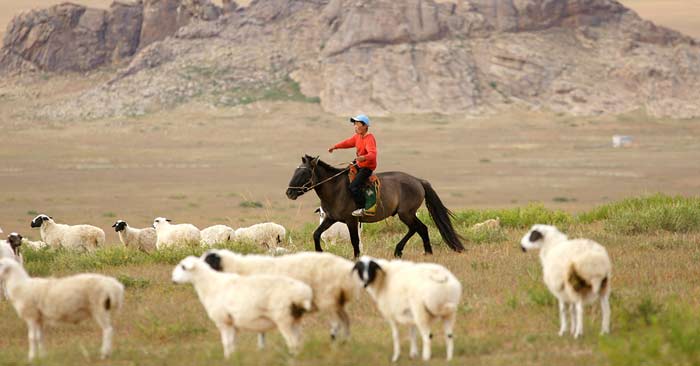Contextualizing the True Shepherd
Developing Creative Strategies to Reach These People on the Move

Not too far from the city where we live, semi-nomadic pastoralists populate the high altitude mountain valleys of Central Asia. These dear people survive through the harshest winters one could imagine by managing large herds of goats and yak. Until now the gospel has not taken root among these Muslims. The primary challenge for high-altitude village ministry has always been how to establish an accepted and valued entry point for an ongoing presence, but over several years an opportunity has come together for our team to form a business that, God willing, will help develop the local cashmere industry.

Like many nomadic pastoralists, these people live primarily off the dairy products of their animals, but these people also gain an income from goat hair and yak hides. Our research has confirmed that the goats they work with produce world-quality elite cashmere. That sounds great but these shepherds don’t have an informed concept of what properties influence the dollar value of cashmere. Chinese buyers have created a monopoly by purchasing all the cashmere based on weight rather than by quality grades. This means shepherds do not get full market value for their higher quality fiber. Besides this, cashmere, once removed from the goats, is not processed locally. All of the profit from the value-added steps of processing is realized outside of the country. This is what we are working to change.
The socio-economic impact is significant. We source the fiber and export it to the West where we have partnered with others who create retail outlets for cashmere yarn in North America. As a result we pay 30% higher prices for shepherds who agree to sell to us directly because we have eliminated the middleman. We help establish brand recognition for their cashmere, bringing greater dignity to nomadic shepherds, who are often viewed as being second-class people.
We believe God will establish networks of believers in these mountain valleys through this business. Cashmere is an ideal gateway for relational engagement. We go from village to village, educating local shepherds about cashmere. We help them with better breeding for improved fiber. We teach them how to collect the hair and sort it by quality. Then we follow up from house-to-house, building relationships with families where ministry opportunities abound.
The vision is to broadly sow the gospel amidst these unreached, remote semi-nomads and to connect those who respond with national believers from way down in the city. When these city-folk engage, God grows their love for their nomadic counterparts, whom they may have once regarded poorly. They are excited to have natural opportunities to convey the person and message of the gospel where it has never been heard before. There they can help each other grow in their faith, persevere in a hostile environment, and make the name of Christ known with wisdom and boldness.
Zukra (not her real name) lives in a remote village area where she came to faith in Jesus Christ ten years ago. Her daughter became afflicted with demons suddenly when she was in 4th grade. For 3 years she could not speak and was not in her right mind. Zukra took her to every doctor, Muslim teacher and witch doctor she could find; but no one could help her. Her sisters were followers of Jesus. They kept telling her that Jesus could heal her daughter but she hated them because they had converted from Islam and “sold their religion to become Russians.” Eventually in desperation Zukra asked her sisters to come and pray. When they prayed in Jesus’s name everyone saw a dark presence leave her and exit the house. Zukra’s daughter was miraculously delivered. The whole family came to Christ that day. Today her daughter continues to live in freedom, but Zukra’s family lives in fear of persecution.
It is not abnormal for the few scattered believers in villages to be ostracized. They are threatened with beatings and divorce. People steal things from them and sometimes burn their homes. They live in fear of being exposed as Christians.
Because the cashmere business allows us a legitimate reason for continued presence in the villages, we are able to encourage these scattered, isolated believers. Zukra is employed as one of our coordinators for collecting cashmere. By helping her people receive more income for their fiber, she is gaining more authority and dignity in her community.
One of the stated goals of the cashmere business is to pour profits back into the community. The business has already been able to repair the heating system in a school and in day care centers throughout several villages where we work with local shepherds. We have also begun working to serve children with special needs in these villages.
The government has a program that provides financial help for those with special needs. When children are diagnosed with a disability, they are put on the list to receive financial aid from the government. This entitles them to free medical care and therapy at a rehab center down in the city. The problem is that this city is many hours away and therefore inaccessible to most families.
Medical care is poor in these areas. Overwhelmed by children with special needs, local doctors encourage parents to go to a Muslim priest or witch doctor for treatment. People with disabilities are considered cursed, demonized and shamed. Fear and pity are the general attitude. Parents of children with disabilities are often asked what terrible sin they committed that God would curse them with this child. Most of these children do not go to school, and many never leave their homes due to fear and shame.
Last fall, my local believing friend and I met the director of the social services department for the region. We shared about the cashmere business and how we wanted to bless the community by working with their special needs children. We explained that we wanted to bring a team to provide training and make regular therapies available for special needs children.
We told him the story from John 9 of their prophet, the Messiah Jesus, how one day while walking with his disciples they saw a man born blind. The disciples asked Jesus, “Who sinned, this man or his parents that he was born blind?” Jesus responded, that his blindness was not the result of sin, but so that God’s glory would be revealed. Then Jesus healed him!
I told the director that this is God’s heart for people with disabilities. It is not a shame or a curse, but rather the world is broken. God loves these kids and we wanted to help by bringing specialists to train and advise the parents. The director promptly handed me a list of 200 special needs children from the 17 villages in the region.
We live in the city and regularly travel out to the villages. Together with the social workers, we started meeting families of children with disabilities, loving on them and treating them with dignity. We often tell the story of the man born blind and God’s heart of love for people with special needs. I am amazed and grateful for the open doors we have found.
However, in finalizing plans for the anticipated team of specialists, local government authorities, who had been very excited about our efforts, suddenly slammed the door shut at the last minute, threatening investigation by the police if we tried to work in the villages. It was an unfortunate reminder of the suspicion, fear, power plays and tight control authorities wield in these close village communities. It was also an abrupt reminder that things are not always as they seem. Situations and relationships can change quickly. Even though we speak their language well, we often have no idea what is really going on.
The cashmere business has allowed us access to these village regions. Tangibly loving on the marginalized has allowed us opportunities for deeper relationships. We have been given a very natural way to proclaim God’s heart for their kids. We still have a lot to learn, but are grateful for all the opportunities we have to engage these people.








comments